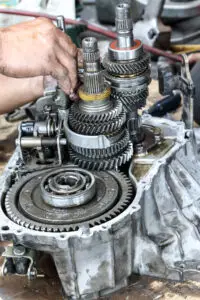Shudders, rumbles, and drips — signs of transmission trouble can appear in several ways. Early detection is key to keeping any repairs your transmission may need quick, simple, and affordable. Ultimately, your transmission facilitates each gear shift and keeps the selected gear fully engaged whether you drive an automatic or manual vehicle. That means you’ll notice signs of trouble when shifting, accelerating, and decelerating. More specifically, we’ll look at changes around your vehicle’s performance, new sounds while driving, and transmission fluid issues.
Changes in Your Car’s Performance
Whether you often drive in city traffic or on highways, changes in your car’s performance should catch your attention. Slipping gears can lead to sudden hesitation or jerking. Worn gear components can make shifting difficult. Issues around gear engagement can delay movement and cause poor overall acceleration. If you notice any of these performance issues, it’s a warning sign of trouble with your car’s transmission.
Sudden Hesitation or Jerking
You’ve heard the term slipping gears, but what does it feel like? Most often, it’s when your vehicle suddenly hesitates or jerks due to slipping out of gear and into neutral. When this happens, your car loses acceleration power until you’re able to get back into gear. You may just need new transmission fluid or there may be a mechanical problem with one or more gears.
Rough or Difficult Shifting
If you drive a manual transmission, it’s easy to tell when your car isn’t shifting gears the way it should. Difficulty shifting gears can easily turn into a complete inability to shift over time. Often, difficulty shifting starts in lower gears or reverse, since they put the most strain on your transmission or clutch.
Delayed Movement or Poor Acceleration
Does it take a few seconds for your car to start moving when you press the gas pedal? Though certain transmissions may normally have a slight pause before your car responds, if this pause is out of the norm or becomes more noticeable, it points to transmission trouble. You may also notice slower acceleration in general. These are a clear indication it’s time to have your transmission inspected.
New Sounds While Driving
You’re likely used to the normal sound of your vehicle — the hum of the engine and tick of blinkers. But if new sounds start up, especially while you sit in neutral or during gear shifts, it’s time to consider whether transmission trouble is brewing.
Noise in Neutral
New noise or shaking in neutral are clear ways to tell there’s a problem with your car. Often, neutral noise indicates you need a transmission fluid replacement service, though sometimes it can indicate a more serious issue. In either case, changes in how your car sounds or feels in neutral are a clear sign it’s time to visit your mechanic.
Grinding During Gear Shifts
One of the most common signs of transmission trouble from manual vehicles is grinding during gear shifts. Most often, this indicates a mechanical issue like worn gear parts and you may also notice your car shaking during each shift. This will continue to get worse over time and you may start experiencing difficulty shifting gears, so it’s important to have your vehicle inspected soon.
Humming or Whining
Do you hear whining when you shift into reverse? It may be time for fresh transmission fluid. Does it get louder when you try to accelerate? There may be a clogged filter in your transmission. Is the humming or whining sound consistent while your car is running? Your transmission fluid may be low due to over-contamination or a leak. In any case, it’s a clear sign it’s time to have the system inspected for possible repairs or servicing.
Issues with the Transmission Fluid
Especially if you drive an automatic transmission vehicle, proper fluid is essential to keep your car operating smoothly and efficiently. However, no matter what type of vehicle you drive, it’s important to pay attention to issues around transmission fluid to ensure moving parts stay lubricated and the system is properly pressurized.
Low or Dirty Fluid
Many vehicles allow you to check the level and condition of transmission fluid using a dipstick similar to what you’d use to check your engine oil. Take time to do this regularly and pay attention if the level becomes low, the fluid seems overly thickened, or the fluid looks black and smells burnt. Each of these can cause performance problems, speed up wear, or lead to overheating — or if the fluid is blackened, the transmission likely is already overheating. A transmission fluid replacement service should be scheduled as soon as possible.
Signs of a Transmission Fluid Leak
Look under your car and pay attention as you back out of parking spaces. Do you notice drips under your vehicle? Depending on their location, it can indicate a transmission fluid leak, especially when accompanied by any of the above signs. Because the transmission is right next to the engine, it can be difficult to determine which fluid is leaking, so the best thing to do is to have a mechanic inspect for any necessary repairs.
Trust the Transmission Experts at Your Local AAMCO Chicagoland
Don’t get spooked by warning signs from your transmission. Whether or not they’re urgent, the expert mechanics at your local AAMCO Chicagoland will help restore a smooth-operating transmission so you can drive away with confidence. Schedule your appointment with us today!






